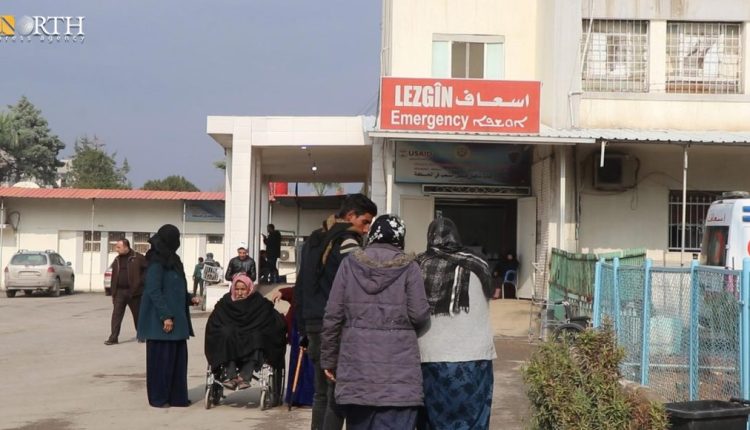
By Samer Yassin
HASAKAH, Syria (North Press) – Fiddaal-Latif, 35, a resident of the village of Ab al-Shouk in the northern countryside of Hasakah Governorate, northeastern Syria, has been hospitalized at al-Shaab (people) Hospital in al-Aziziyah neighborhood in the city of Hasakah for the past five days due to drinking contaminated water.
The hospital receives up to 150 cases of poisoning, gastric distress, and kidney problems due to consuming contaminated water amid supply shortage of drinking water.
Hasakah’s drinking water comes from Alouk Water Pumping Station, located in the countryside of Sere Kaniye (Ras al-Ain). The Sere Kaniye region has been under the control of Turkish forces and their affiliated Syrian opposition factions since Oct. 2019 following a military operation dubbed ‘Peace Spring’. Since then, Turkey and its factions have repeatedly cut off water to Hasakah and its surrounding areas.
Previous agreements sponsored by Russia, the UNICEF, the International Committee of the Red Cross (ICRC), and others stipulated that the Autonomous Administration of North and East Syria (AANES) would supply the station with electricity in exchange for the factions pumping water to Hasakah.
The Turkish-backed factions, however, have repeatedly breached all such deals by cutting of water to Hasakah.
Recurrent injuries
This is not the first time that al-Latif’s has suffered stomach pains, or intestinal infections due to drinking contaminated water.
Al-Latif stated that she occasionally resorts to purchasing bottled water for drinking purposes. However, due to the financial strain on her family, which includes nine children, the costs become unaffordable, compelling her to stop buying it and resume relying on the contaminated water stored in their household tank.
She emphasized that her household tank is in a deteriorated state, resulting in rust particles mixing with water. In addition, the tank has accumulated mud and sand due to the contaminated water by tankers.
Prior to the woman’s hospitalization, her young daughter had also been admitted to the hospital due to vomiting and experiencing bloody diarrhea, which were attributed to the same reasons of consuming contaminated water.
The patient currently experiences nausea every time she drinks water, making her reliant on intravenous fluids to provide her body with necessary liquids.
On October 5, Turkish forces, through airstrikes and drones, targeted several infrastructure sites in northeastern Syria, knocking several vital facilities and installations out of service, including the Derbasiyah power station, which supplies Alouk with electricity.
Following the commissioning of the Derbasiyah power station, maintenance teams at the Alouk station made efforts to restart the station. However, their attempts were unsuccessful due to encroachments and theft that had adversely affected the station, its equipment, and its infrastructure by Turkish-backed factions. As a result, the residents in Hasakah continue to face water scarcity, depriving them of access to clean water.
The water disaster in Hasakah is attributed to the unsuitability of groundwater wells within the city and the surrounding areas for drinking purposes. These wells do not meet the necessary standards for providing safe and clean drinking water.
Himedi al-Hamoud’s family, who were displaced from Deir ez-Zor Governorate in eastern Syria to Hasakah, relies on water supplied by tankers, which fill water from wells located in the al-Hemma area in the countryside of Hasakah. However, there are significant concerns regarding the contamination of water in that area.
Al-Hamoud said he has been relying on water delivered by tankers for a long time. Filling his 1000-liter tank cost him 25,000 ($1.5) Syrian pounds (SYP) during the most recent delivery.
Patients’ suffering
Due to her deteriorating health condition, al-Hamoud’s wife, who suffers from kidney disease, had to seek medical treatment in the Syrian capital, Damascus.
Al-Hamoud is compelled to purchase bottled water in adherence to instructions given by a doctor in Damascus, in addition to covering the expenses of filling the household tank from the tankers.
Rojin Ibrahim, the charge nurse in the Internal Medicine Department at Al-Shaab Hospital in Hasakah, informed North Press that the daily number of cases related to diseases caused by the consumption of contaminated water is currently estimated to range between 100 and 150 cases.
During summer, the number of cases related to contaminated water can rise to 300 per day due to increased water demand. Some countryside residents may lack access to clean water from tankers.
According to Ibrahim, the addition of chlorine to tanker water for sterilization purposes may lead to the development of diseases and have adverse effects on certain individuals.
Doctors at the hospital typically prescribe painkillers and antispasmodics for the majority of cases related to contaminated water. However, in cases of intestinal poisoning and persistent diarrhea, a week-long stay may be necessary. During this period, patients receive intravenous fluids and specialized medications to treat their condition.
Despite the positive outcomes of treatment, the lack of clean and safe drinking water leads to a cycle of re-infection among patients. Moreover, the lack of access to clean water contributes to the formation of kidney stones.
